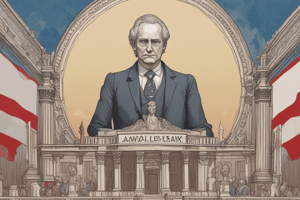Podcast
Questions and Answers
What is the primary basis of legitimacy for the ministers in a parliamentary democracy?
What is the primary basis of legitimacy for the ministers in a parliamentary democracy?
- The Executive Branch
- The Legislative Branch
- The Constitution
- The Electorate (correct)
What type of democracy is characterized by a system where three or more parties govern, either separately or as part of a coalition?
What type of democracy is characterized by a system where three or more parties govern, either separately or as part of a coalition?
- Parliamentary Democracy
- Multiparty Democracy (correct)
- Totalitarian Democracy
- Representative Democracy
What is the primary factor that shapes the performance of democracy in a nation?
What is the primary factor that shapes the performance of democracy in a nation?
- Political Freedom
- Cultural Values
- Economic Freedom
- Legacies (correct)
Which of the following is a key feature of democratic government?
Which of the following is a key feature of democratic government?
What is the primary way in which democracy supports private enterprises?
What is the primary way in which democracy supports private enterprises?
What is the relationship between democracy and individualism?
What is the relationship between democracy and individualism?
Which of the following is a common feature of totalitarian systems?
Which of the following is a common feature of totalitarian systems?
What is the primary benefit of democracy for businesses?
What is the primary benefit of democracy for businesses?
Which of the following countries is an example of a representative democracy?
Which of the following countries is an example of a representative democracy?
What is the primary distinction between collectivism and individualism?
What is the primary distinction between collectivism and individualism?
Flashcards are hidden until you start studying
Study Notes
The Political Environment
- A political system is a complete set of institutions, political organizations, and interest groups that integrate various parts of a society into a viable, functioning entity.
- It influences the extent to which government intervenes in business and the way business is conducted both domestically and internationally.
Individualism vs. Collectivism
- Individualism champions the primacy of the individual over the group, whereas collectivism advocates the primacy of the group over the individual.
- In an individualistic paradigm (e.g., United States, Canada, Australia, Italy), political officials and agencies play a limited role in society.
- The relationship between government and business tends to be adversarial, with government intervening in the economy to deal with market defects, but generally promoting marketplace competition.
- Laissez-faire is the concept that the government should not interfere in business affairs.
Collectivism
- Under a collectivist paradigm, the government defines economic needs and priorities, and partners with business in major ways.
- The government is highly connected to and interdependent with business, and the relationship is cooperative.
- A collectivist outlook encourages the political system to develop regulations that promote social justice, labor rights, income equality, and workplace harmony.
Political Ideology
- A political ideology is the body of goals, theories, and aims that constitute a sociopolitical program.
- Political ideologies can be analyzed using a spectrum, with democracy and totalitarianism as endpoints.
- Understanding the ideals and means of democracy and totalitarianism helps interpret other ideologies.
Democracy
- Democracy and individualism are intrinsically related and mutually reinforcing.
- Democratic government institutes personal and political rights, civil liberties, fair and free elections, and independent courts of law.
- Different legacies shape the performance of democracy in a nation, leading to different types of democracies (e.g., multiparty, parliamentary, representative).
- In modern democracies, political and economic freedoms are increasingly interconnected, supporting private enterprises, encouraging investments, and sustaining productive enterprises.
Studying That Suits You
Use AI to generate personalized quizzes and flashcards to suit your learning preferences.




